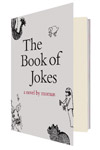A few months ago, the editors of this magazine asked if I would be interested in being part of an experiment in criticism. They were curious what would happen if we inverted the standard “anonymous review” formula—if instead of the reviewer having the cloak of anonymity, we were to keep the book under review anonymous from its critic, and thereby shield it from any and all prejudice—whether positive or negative, whether directed at the author, the publishing house, the blurbers, the cover art, etc. I swore several oaths to stay true to the project (Eds.: “No googling”), and soon enough a book arrived at my house. Its covers, front matter, and endpages had all been stripped, and the spine blacked out with a Sharpie. I didn’t know what it was called or who wrote it or who was publishing it or when. I didn’t know if it was the author’s first or twenty-first publication. Fiction? Nonfiction? Genre? Self-published? I didn’t know anything (and at this writing, I still don’t) except that it wasn’t poetry. What could I do? I began to read.
Dad darkens my sister’s doorway, throws his shadow across the fine-haired skin of her white belly. The lamplighters crane to watch. They will report what they’ve seen to the postmen, and the postmen will report it to the teachers, and the teachers—solemnly—to their classes. Then the school bullies will corner me in a piss-stinky lavatory cubicle and tell me.
But I’ll know already. Because of the taste on Dad’s dick.
So, uh, not nonfiction then? (Please, please, please don’t let this be nonfiction.)
Soon after, the speaker finds himself in that very lavatory, getting bullied just as predicted. “Do you want to die peacefully in your sleep like your grandpa,” the bullies ask him, “or screaming in terror like his passengers?”
Now wait a minute. I reread the sentence to be sure. Was it? Oh yeah. That’s a joke! A joke I’d heard before! Realizing this made me realize that the line about Dad’s dick in the first scene was, in fact, a punch line. The whole scene was a retelling of an old, gross—but hardly unfunny—joke. I read on, and the jokes kept coming.
The book follows two main characters, the priapic Sebastian Skeleton and his perpetually beset son Peter, who switch off chapters as narrator. They—along with Peter’s sister, Luisa, Sebastian’s estranged wife, Joan, Joan’s current lesbian lover (also named Joan), and two felons named the Murderer and the Molester—live in an X-rated cartoon universe the nature of which Peter explains thusly: “Bad jokes, dirty jokes are, to my world, what the force of gravity is to yours.… I am a character trapped in a book of jokes—jokes, furthermore, which are in very poor taste.”
By the time I encountered this explanation (it comes about fifty pages in) I was already thinking about a few other books that have attempted conceits like this: Extravaganza by Gordon Lish, Funny by Jennifer Michael Hecht, and (twice-removed, conceit-wise, but still relevant) No Lease on Life by Lynne Tillman. These are the kinds of associations that book jackets typically make for you (“In the tradition of…”; “The best _____ since _____”), so I felt a touch of readerly pride at having earned my reference points unabetted, and this satisfaction was compounded by the knowledge that I had no way to “check” my conclusions.
In a club as small as this one (the joke-book-as-literature), it would be churlish to issue rankings to the membership. This book’s pace is breakneck, and logic holds no sway over the proceedings. Randomness and depravity rule the day, often to great and surprising effect; though occasionally to this reader’s disgust, such as in the scene of the Molester’s great—ahem—triumph. I was sometimes unsure whether the author intended the book as anything other (I hesitate to say “more”) than a joke itself, though this begged the unsettling question of who that joke was on.
As to the sensory-deprivation school of reading, I have to say that it was an enormously disorienting experience. Jacket copy does more than simply entice you to buy. It supplies a framework for one’s experience. It is less a movie trailer than it is a placard on a museum wall, telling you not just how to look at the painting, but what to see there when you do. I found myself freed from the tyranny of the preprogrammed response, set adrift, context-free, at sea with an alien text. Every reviewer—every reader—should hope to be so lucky.





